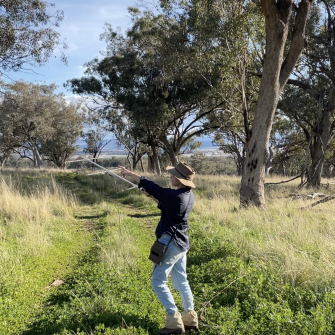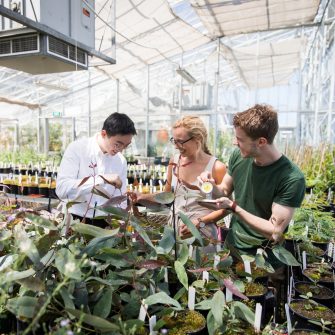Bachelor of Advanced Science (Honours)/Social Sciences
- Commencing Terms
- Term 1, 2 & 3
- Duration
- 5 Year(s)
- Delivery Mode
- Face-to-face (includes blended)
- Campus
-
Kensington
- Codes
- UAC code 429380
- Program code 3924
- CRICOS code 110671A
-
ATAR/2025 lowest selection rank
- 93.0 View all admission criteria
-
2026 Indicative first year full fee
- $13,000*
-
2026 Indicative full fee to complete degree
- $67,500*
-
2026 Indicative first year full fee
- $60,500*
-
2026 Indicative full fee to complete degree
- $335,500*

Application closures for 2026
International applications for all undergraduate programs, as well as postgraduate programs offered by the faculties of Arts, Design & Architecture, Engineering (excluding Master of Information Technology and associated programs) and Science are now closed to New Overseas Student Commencement (NOSC) for 2026 intakes.
Postgraduate programs offered by the Business School and the faculties of Law & Justice and Medicine & Health remain open. Master of Information Technology (and associated programs) also remain open.
- Overview
- Entry requirements
- What will I study?
- Future careers
- How to apply
- Fees & Scholarships
Overview
Take your passions, purpose and potential to new heights with an advanced double degree at a global top 20 university (QS World University Rankings, 2024–2026). You’ll benefit from a broad and flexible education with hands-on learning experiences, cutting-edge facilities and learn from world-leading academics to prepare you for the jobs of tomorrow.
The Bachelor of Advanced Science (Honours) degree will prepare you for a wide range of careers. From earth science to psychology, mathematics to biotech, no matter what you choose, you will gain in-demand transferable skills that you can apply to almost any industry.
In the Bachelor of Social Sciences degree, you’ll explore various political, international, social, environmental and economic challenges. You’ll gain the knowledge and skills you need to inform public debate and shape the policies that affect society.
With expertise across two highly relevant disciplines, this double degree will broaden your skill set and expand your career possibilities.
Key features
- Flexibility and variety to customise your career path
At UNSW, you’ll be encouraged to explore a wide range of focus areas and career paths so you can shape your degree to suit your passions, purpose and potential. In Advanced Science (Honours), choose from 24 majors across the physical, natural and human sciences. In Social Sciences, you’ll have 16 specialisations on offer, including policy, environment, sociology, media and international studies. With so many options, you’ll be well-equipped to find the path suited to your goals.
- Be empowered to lead your learning with SciConnect
SciConnect is an innovative online system that's integrated across your whole science degree. It will be there to help you settle into university, track your professional development and showcase your skills to future employers. The platform focuses on connecting you with four key areas to help you get the most out of your student experience including orientation, co-curricular opportunities and communities, career development and a graduate portfolio.
SciConnect enables you to shape your university experience and supports you in showcasing your talents to potential employers with a comprehensive impression of who you are, beyond your academic transcript.
- Strengthen your skills with a supervised research project
Your honours year is an integral part of your degree. It involves a supervised research project and, in some cases, advanced coursework. You’ll conduct original scientific investigations and analyses while developing critical and integrative thinking skills.
- Multiply your opportunities with a specialised double degree
Employers are always looking for candidates who stand out from the crowd. Graduating with a competitive double degree demonstrates dedication and specialised expertise, giving you a competitive advantage in the job market.
- Explore your career possibilities through research and work integrated learning
Bridge the gap between study and employment with our Work Integrated Learning (WIL) and Research Integrated Learning (RIL) opportunities. These experiences allow you to explore different career paths and apply your skills professionally while being guided by world-leading academics.
During your studies, you’ll collaborate with students from a range of disciplines to tackle real-world problems in project-based learning initiatives. This multidisciplinary educational approach allows you to develop essential technical and professional skills, so you thrive in your future career.
Why study at UNSW?
-
As a global top 20 university (QS World University Rankings, 2024–2026), we’re guiding the future leaders of science and economics in Australia and overseas.
UNSW Science is ranked in the global top 50 for nine subjects (QS World University Rankings by Subject, 2025).
- Ranked =#32 globally for psychology
- Ranked #44 globally for natural sciences
- Ranked =#49 globally for chemistry
- Ranked =#37 globally for earth and marine sciences
- Ranked #38 globally for environmental sciences
- Ranked =#28 globally for geology
- Ranked #31 globally for geophysics
- Ranked #48 globally for mathematics
- Ranked #27 globally for materials science
We’re ranked #1 in Australia for research output in physical sciences and #2 in Australia for research output in earth and environmental sciences, and chemistry (Nature Index Institution Outputs, 2024).
-
With over $450 million invested in our state-of-the-art facilities, UNSW Science is well-equipped to help you launch your science career. You’ll learn in world-class laboratories, clinics, simulators and biological imaging facilities. Our research centres are helping to advance science in renewable energy, human health and environmental sustainability.
-
You’ll join a diverse and inclusive community of students, academics and professionals who are transforming ideas into impact. From peer mentoring and student support services to the 300+ clubs and societies across UNSW, you’ll connect with open-minded students whose perspectives will expand your worldview.
You’ll build up your professional identity through SciConnect – an innovative online system that helps you settle into university, track your professional development and showcase your skills to future employers. Plus, you’ll have the chance to take your studies abroad through International Student Exchange.
Want to see more from UNSW Science?
Entry requirements
-
- The 2025 Lowest Selection Rank (LSR) is the adjusted rank (ATAR plus adjustment factors) you would have needed to gain entry to this degree in 2025.
- The 2025 A levels score is based on four Advanced Level (A2) subjects. Entry scores are calculated from the best three or four A2 subjects (excluding repeated subjects) using the following values: A*=6, A=5, B=4, C=3, D=2, E=1. At most one Applied A Level subject may be included in the best four subjects used to calculate the aggregate.
- The 2025 IB Diploma is an indication of the IB you would have needed to gain entry to this degree in 2025. It is to be used as a guide only.
- The 2025 Lowest ATAR is the lowest ATAR (before adjustment factors were applied) to which an offer was made. Where <5 is listed, this indicates that less than 5 ATAR-based offers were made and so the score has not been published. N/A indicates no offers were made on the basis of ATAR.
*The Lowest ATAR to which an offer was made, for this program, is based on a UNSW Gateway Early Conditional Offer.
-
At UNSW, we are committed to ensuring prospective students have all the information they need in order to make informed decisions about their study options.
To assist you in gaining a better understanding of how Admissions works at UNSW, we have provided you with a summary of ATAR offers and the student profile.
We hope this information will help you identify the degree that is right for you.
Assumed knowledge
Mathematics Advanced or Mathematics Extension 1 (depending on chosen area of study) plus one or more of Biology, Chemistry, Earth and Environmental Science, Physics.
Adjustment Factors
We offer a range of adjustment factor schemes that reward students for academic performance and extra-curricular achievements. These schemes also take into account a range of personal and educational disadvantages that may have affected your studies.
HSC Plus
This scheme rewards students who perform well in Year 12 subjects that are relevant to their preferred UNSW degree. You may be awarded up to five points.
Elite Athletes, Performers and Leaders (EAPL)
This program recognises achievements in the areas of sport, academia, leadership and music at an elite level. You may be eligible for up to five points.
Educational Access Scheme (EAS)
Factors such as illness, financial hardship, language difficulties or attending a particular school can mean you don't always get the best possible marks in Years 11 and 12. If one of these situations applies to you, submit an application for the Educational Access Scheme (EAS) via UAC. Eligible students can receive between 1 and 10 points towards their chosen UNSW degree.
Admission pathways
Your ATAR is not the only measure of your potential to succeed, which is why we offer a range of pathways into university. Explore your options below and get in touch with our Future Student Advisers to discuss your path to UNSW.
Gateway Admission Pathway
This scheme is open to students who attend Gateway schools, live in a low-socioeconomic area based on IRSAD and IEO indexes of SEIFA criteria, or are an Aboriginal and Torres Strait Islander person. It adjusts the ATAR requirements for your preferred UNSW degree and provides early offers and early conditional offers to UNSW.
Entry programs for Australian Aboriginal and Torres Strait Islander people
We offer entry programs for Indigenous Australians, including the Indigenous Preparatory Programs and the Indigenous Admission Scheme (IAS). The entry pathway program you apply for will depend on the degree you want to study.
Progression requirements
Entry into the Honours program in Science is subject to academic performance and progression requirements. Students may exit the Advanced Science (Honours) program with a B Science award if they are unsuccessful in applying for entry into Honours.
English language requirements
You may be asked to provide evidence of your English proficiency to study at UNSW depending on your educational background and citizenship. English language skills are vitally important for coping with lectures, tutorials, assignments and examinations - this is why UNSW requires a minimum English language competency for enrolment.
If you’re completing an Australian Year 12 qualification (e.g. NSW HSC or equivalent), you do not need to provide anything extra to prove your proficiency. Your qualification will be used as evidence of your English proficiency.
If you do need to provide evidence of your English proficiency, this will be indicated in your application. You can prove this by providing evidence that you meet one or more of the following criteria:
- English language tests and university English courses
- Prior study in the medium of English
- Other qualifications
If you need to improve your English skills before you start your degree, UNSW College’s Academic English Programs are for you. The programs are suitable for various English levels and help you prepare for university studies and life in Australia.
For more details, visit the English Language Requirements page.
International direct entry
Information for applicants with CBSE, HKDSE or Singapore A Levels Qualification
Calculating your CBSE Score:
Awarded by CBSE, average percentage marks across English or Hindi, and your best four remaining subjects. Where marks are given as a range, the mid-point for that range is used e.g. 75 to 80 = 77.5.
Calculating your HKDSE Score:
Entry requirements are based on the aggregate of the best 5 achieved category A subjects (category B and C subjects are not considered).
For subjects other than Citizenship and Social Development: level 5**=7 points, level 5*=6 points, level 5=5 points, level 4=4 points, level 3=3 points, level 2=2 points, level 1=1 point, Level U=0 point.
For subject Citizenship and Social Development: Attained=2 points, Unattained=0 point. Citizenship and Social Development will only be counted towards the aggregate if the 2 points awarded for Attained ranks among the student’s best five scoring subjects.
If Mathematics Compulsory Part and Extended Part (Module 1 or 2) are both presented, both scores can be counted.
Calculating your Singapore A Levels:
Due to significant changes to the GCE A-Level Curriculum and University Admissions Score (UAS) calculation effective 2026, UNSW assessment is currently under review.
Note: Entry requirements published on this page are correct as of the day of publication and may change without notice.
We do not accept secondary qualifications from this country. We may accept tertiary study results, please contact us for more information.
Please contact us for direct entry requirements.
Admission pathways
If you do not meet the requirements for direct entry into your chosen degree, you may be eligible for a pathway program with UNSW College. UNSW College provides alternative entry options using university-approved content so that you can start your UNSW journey with confidence.
Progression requirements
Entry into the Honours program in Science is subject to academic performance and progression requirements. Students may exit the Advanced Science (Honours) program with a B Science award if they are unsuccessful in applying for entry into Honours.
English language requirements
You may be asked to provide evidence of your English proficiency to study at UNSW depending on whether you are from an English-speaking background or non-English speaking background. English language skills are vitally important for coping with lectures, tutorials, assignments and examinations - this is why UNSW requires a minimum English language competency for enrolment.
If English is not your first language, you’ll need to provide proof of your English proficiency before you can be given an offer to study at UNSW. You can do this by providing evidence that you meet one or more of the following criteria:
- English language tests and university English courses
- Prior study in the medium of English
- Other qualifications
If you need to improve your English skills before you start your degree, UNSW College’s Academic English Programs are for you. The programs are suitable for various English levels and help you prepare for university studies and life in Australia.
For more details, visit the English Language Requirements page.
Check the specific English language requirements for this program
What will I study?
UNSW is introducing a new academic calendar from 2028.
We are moving to a new flex-semester calendar. What does this mean for your studies?
Program structure
The Bachelor of Advanced Science (Honours)/Bachelor of Fine Arts is a double degree that you can complete in five years with full-time study. You’ll complete a minimum of 240 units of credit (UOC) through a combination of majors, minors and electives.
Full program structure
Your double degree consists of:
144 units of credit from Advanced Science (Honours), including:
- Two core research skills courses
- One Science major
- An optional minor
- One Science Honours specialisation
- Science elective courses (if required)
96 units of credit from Social Sciences, including:
- One Social Sciences major
- 12 UOC of Level 1 courses
- 18 UOC of Level 2 courses
- 18 UOC of Level 3 courses
Majors
-
Choose from 25 majors with the Bachelor of Advanced Science (Honours):
Advanced Physical Oceanography
Advanced Physical Oceanography explores physical conditions, processes and interactions in the ocean.Advanced Physics
Explores the laws of nature that govern the behaviour of the universe, from the smallest sub-atomic particles to the universe itself.Anatomy
Study the structure of the human body.Bioinformatics
Bioinformatics integrates computer science and statistics to analyse genetic information in molecular biology.Biology & Biodiversity
Study life science and explore how organisms function, grow, evolve and relate to their environment.Biophysics
Biophysics unlocks how life works by applying physics and mathematics to reveal the mechanisms behind health and disease in complex biological systems.Biotechnology
Biotechnology explores biological processes for producing food, industrial chemicals and pharmaceuticals.Chemistry
Explore chemistry, from sub-atomic particles to spectacular phenomena, the field offers vast opportunities.Climate Systems Science
Gain an understanding of the Earth's Climate System, focusing on areas such as climate change and risks.Earth Science
Earth science investigates our planet’s nature, evolution and powerful forces.Ecology and Conservation
Explore how various organisms interact with one another and their environment.Genetics
Genetics studies fundamental genes that influence every characteristic in humans and other species.Geography
Explore Earth’s landscapes, and environments to understand how they function and change over time.Immunology
Unlock better treatments and prevention strategies for immune-related illnesses.Marine and Coastal Science
Explore marine and coastal science, that looks at all aspects of the marine environment encompassing many sciences from biology to geology.Materials Science
Materials science is the specialised study of creating high-performance materials from metals, ceramics, polymers and composites for society.Mathematics
Mathematics is the science of patterns and underpins all corners of science and technologyMicrobiology
Microbiology studies tiny life forms like bacteria, viruses, fungi and protozoa.Molecular and Cell Biology
Study cell biology, which explores molecular structures, cellular processes, and their roles in function, reproduction and development.Neuroscience
Neuroscience aims to understand the nervous system’s biological and behavioural aspects, as well as to treat diseases like schizophrenia and Alzheimer’s.Pathology
Pathology involves studying diseases at genetic, molecular, cellular and organ levels. Contrary to popular belief, it’s not solely about blood tests.Pharmacology
Discover the effect that drugs have on living tissues and the normal body functions of humans and animals.Physiology
Physiology studies how the human body functions, including organ processes, growth, maintenance and responses during disease and ageing.Psychology
Psychology studies behaviour, mental processes, brain-behaviour relationships, perception, learning, memory and social interactions.Statistics
Statistics is the science of collecting, analysing, presenting and interpreting data. -
Economics
To solve some of our greatest global challenges, you need a sound understanding of what motivates people, businesses, and governments.Environmental humanities
From species extinction and GMOs to climate change and nuclear power – immerse yourself in the social, cultural, and political factors shaping human relations with the natural world.Geographical studies
Together we will discover how we can plan for a better future by combining classroom study with hands-on experience in the field.Global development
Explore issues from urbanisation to widening disparity, environmental threats, and the dominance of communication technologies. Learn the many ways we can create practical and positive change at local, national, and global levels.Human resource management
Develop effective and responsible management skills in various workforce issues – performance, change, health and safety, and beyond.Indigenous studies
Explore the current and traditional Indigenous knowledge, philosophies, and cultural values tied to country.Innovation, strategy and entrepreneurship
Learn how to lead with confidence, discover new opportunities, turn insights into action, and design business strategies that create, capture, and deliver value.International business
Change how the world does business as you make the most of your strong foundation in business, commerce, and economics.International studies
Learn to think creatively about governing solutions for significant challenges - from adapting to global economic changes to managing refugee intakes, human rights, security, and environmental crises.Marketing
Understand how data helps businesses stand out, understand customer behaviour, provide different experiences, and meet customer needs.Media, culture & technology
You'll also discover the complex relationships between local and global media and the role of diverse audiences in media processes.Politics and international relations
Studying politics helps you to understand power. Pave your way for careers in government and business, lead with difference and change the world.Sociology
Join Australia’s oldest sociology department and discover insights from diverse cultures and the lived human experience.
Future careers
Studying at UNSW gives you the optimal balance of theoretical and hands-on learning to prepare you for tomorrow’s workforce. You’ll develop vital transferable skills that you can apply to almost any industry. What’s more, you’ll gain a solid foundation in logical, analytical and critical thinking, as well as vital skills in teamwork and communication.
A double degree will double your career possibilities as you’ll have valuable expertise across two (or more) fields. You’ll have a wide variety of majors and specialisations to choose from in both degrees, allowing you to carve your education to your own career goals.
Explore our study areas below to discover the range of potential career paths available across the fields of science and social sciences.
-
Psychologist
Pilot
Environmental scientist
Data scientist
Materials scientist
Clinical coder
Biotechnologist
Teacher
Neuroscientist
Genetic counsellor
Mathematician
Medical technician
Biologist
Food scientist
Laboratory technician
-
Campaign manager
Advocate
Department of Foreign Affairs and Trade official
International business consultant
Local government official
Non-government organisation official
Policy analyst
Political adviser
Political journalist
Project officer
Program manager
Research consultant
Research officer
Tourism and trade adviser
United Nations official
How to apply
Applications for undergraduate study from domestic students (Australian citizens, Australian permanent residents, Australian permanent humanitarian visa holders and New Zealand citizens) are processed by the Universities Admissions Centre (UAC).
Visit the Apply section of the UAC website and you can nominate up to five degrees in order of preference, with the first being your most desired degree and university.
On-time applications for admission usually close at the end of September each year for Term 1 admission. Late applications can be submitted, but a late fee will apply. For study starting in Term 1, the majority of offers are made in December and January. Visit the UAC website for key dates for admission outside of Term 1.
Ready to start your application?
For most international students, applications are submitted via our Apply Online service. We encourage you to submit your completed application as early as possible to ensure it will be processed in time for your preferred term.
Some high-demand programs with limited places, may have an earlier application deadline or may have an earlier commencement date. For details, visit the international admissions information page.
*If you are an international student studying an Australian qualification, go to the Universities Admission Centre (UAC) for application and UAC key dates. Note: If you are under 18 years of age, you need to make special arrangements. For details, visit the under 18 international students page.
Ready to start your application?
Fees & Scholarships
Commonwealth Supported Place multiple Student Contribution Bands may apply for this double degree. See single degrees for the applicable fee bands.* The student contribution for a Commonwealth Supported Place is an indication only of the amount payable in Year 1 based on a standard full-time load of 48 credit points (1.0 EFTSL). The actual student contribution you will be liable for depends on your individual program of study and the calendar year in which you enrol. Actual fees are calculated upon enrolment. Student contribution amounts are subject to annual review by the University and may increase each year during your studies (subject to caps determined by the Australian Government), effective at the start of each calendar year. The indicative fees listed here are based on an estimated average and are for tuition only other fees and charges are not included.
*Fees are subject to annual review by the University and may increase annually, with the new fees effective from the start of each calendar year. The indicative fees listed here are based on an estimated average and are for tuition only, other fees and charges are not included. The amount you pay will vary depending on the calendar year to enrol, the courses you select and whether your study load is more or less than 1 Equivalent Full Time Student Load (8 courses per year).
Indicative fees are a guide for comparison only based on current conditions and available data. You should not rely on indicative fees. More information on fees can be found at the UNSW fees website.
Indicative fees to complete the program have been calculated based on a percentage increase for every year of the program. Fee increases are assessed annually and may exceed the indicative figures listed here.
Indicative fees to complete the program include tuition plus an estimate of study-related costs of approximately $1,000 per year. To find out more about other costs, visit UNSW International.
Scholarships
At UNSW, we award over $83 million in scholarships each year. We pride ourselves on rewarding excellence and making university accessible to students from all walks of life. Whether you’re a domestic or international student, our range of scholarships, prizes and awards can support your journey.
Progress starts here – at a world-leading university

Top 20 Worldwide
UNSW is ranked #20 university in the world
QS World University Rankings, 2024–2026

Most Employable Graduates
Winner of the AFR Most Employable University Award six years in a row
AFR Top100 Future Leaders Awards, 2020–2025

Australia's #1 for Innovation
Highest number of startups and spinouts from university-developed tech
SCOPR report, 2024






